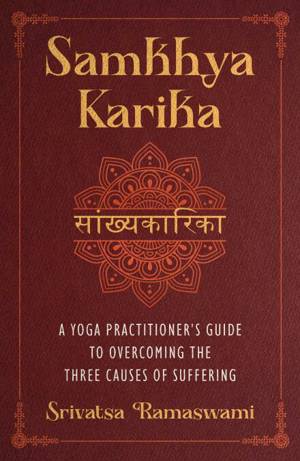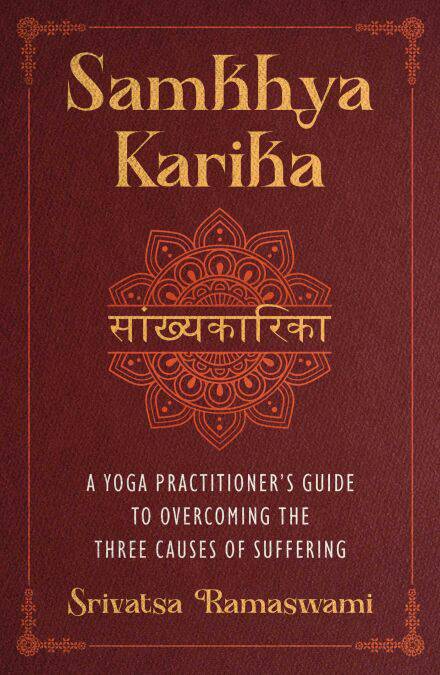
- Afhalen na 1 uur in een winkel met voorraad
- Gratis thuislevering in België vanaf € 30
- Ruim aanbod met 7 miljoen producten
- Afhalen na 1 uur in een winkel met voorraad
- Gratis thuislevering in België vanaf € 30
- Ruim aanbod met 7 miljoen producten
Zoeken
Samkhya Karika E-BOOK
A Yoga Practitioner's Guide to Overcoming the Three Causes of Suffering
Srivatsa Ramaswami
E-book | Engels
€ 19,00
+ 19 punten
Omschrijving
• Explores the meaning of all 72 verses of the 4th-century Sanskrit text Samkhya Karika word by word, providing helpful explanations and annotations to aid your understanding
• Reveals how Samkhya Karika explains the three duhkhas, or causes of suffering, and how to deal with them to reach a state of freedom from pain and suffering
• Shows how Samkhya Karika explains the origin and evolution of the universe and how it identifies the true nature of the Self, the Atman, as unvarying consciousness distinct from the body-mind complex
Along with Yoga and Vedanta, Samkhya is one of the three schools of Vedic philosophy that teach the individual how to break free from the cycles of death and rebirth. Samkhya Karika is the earliest surviving text on Samkhya, a brilliant masterpiece written by fourth-century Indian poet and philosopher Ishvarakrishna, who was considered to be an avatar of the Classical Sanskrit poet Kalidasa.
Presenting a translation of Samkhya Karika from the original Sanskrit along with detailed commentary, Srivatsa Ramaswami explores the meaning of all 72 slokas (verses) word by word, providing helpful explanations and annotations to aid in your understanding. He shows how Samkhya philosophy explains the origin and evolution of the universe and how it identifies the true nature of the Self as unvarying consciousness, distinct from the empirical body-mind complex. He reveals how Samkhya Karika explains the three duhkhas, or causes of suffering, and how to deal with them to reach the goal of Samkhya: kaivalya, a state of deep contemplation where one is unafflicted by pain and eternally free from the cycle of samsara.
Providing a user-friendly guide to Samkhya for yoga practitioners and students of yoga philosophy, this book also shares insightful teachings from the author’s teacher, the legendary Sri Krishnamacharya, hailed as "the father of modern yoga."
• Reveals how Samkhya Karika explains the three duhkhas, or causes of suffering, and how to deal with them to reach a state of freedom from pain and suffering
• Shows how Samkhya Karika explains the origin and evolution of the universe and how it identifies the true nature of the Self, the Atman, as unvarying consciousness distinct from the body-mind complex
Along with Yoga and Vedanta, Samkhya is one of the three schools of Vedic philosophy that teach the individual how to break free from the cycles of death and rebirth. Samkhya Karika is the earliest surviving text on Samkhya, a brilliant masterpiece written by fourth-century Indian poet and philosopher Ishvarakrishna, who was considered to be an avatar of the Classical Sanskrit poet Kalidasa.
Presenting a translation of Samkhya Karika from the original Sanskrit along with detailed commentary, Srivatsa Ramaswami explores the meaning of all 72 slokas (verses) word by word, providing helpful explanations and annotations to aid in your understanding. He shows how Samkhya philosophy explains the origin and evolution of the universe and how it identifies the true nature of the Self as unvarying consciousness, distinct from the empirical body-mind complex. He reveals how Samkhya Karika explains the three duhkhas, or causes of suffering, and how to deal with them to reach the goal of Samkhya: kaivalya, a state of deep contemplation where one is unafflicted by pain and eternally free from the cycle of samsara.
Providing a user-friendly guide to Samkhya for yoga practitioners and students of yoga philosophy, this book also shares insightful teachings from the author’s teacher, the legendary Sri Krishnamacharya, hailed as "the father of modern yoga."
Specificaties
Betrokkenen
- Auteur(s):
- Uitgeverij:
Inhoud
- Aantal bladzijden:
- 224
- Taal:
- Engels
Eigenschappen
- Productcode (EAN):
- 9798888501542
- Verschijningsdatum:
- 5/05/2025
- Uitvoering:
- E-book
- Beveiligd met:
- Adobe DRM
- Formaat:
- ePub

Alleen bij Standaard Boekhandel
+ 19 punten op je klantenkaart van Standaard Boekhandel
Beoordelingen
We publiceren alleen reviews die voldoen aan de voorwaarden voor reviews. Bekijk onze voorwaarden voor reviews.











